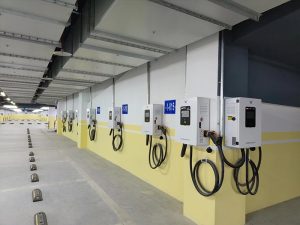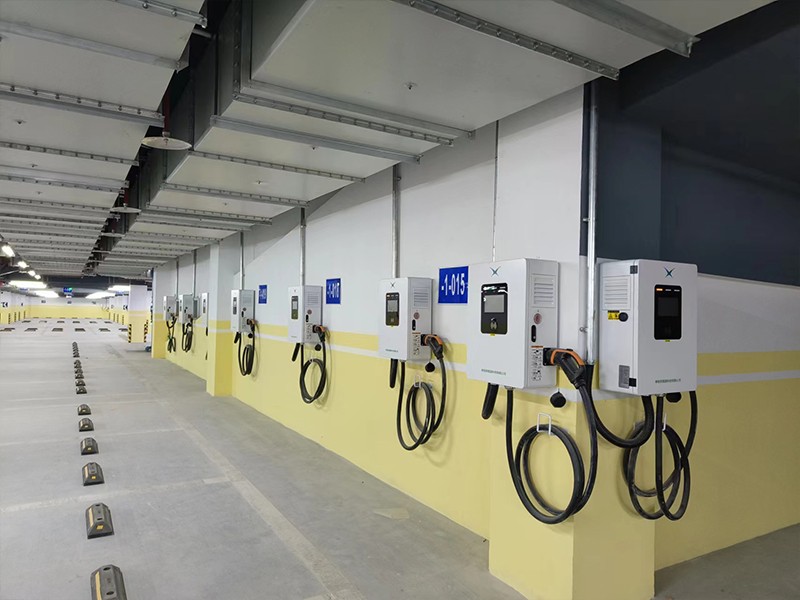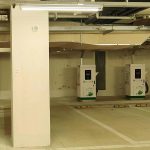Demand for electric vehicles (EVs) is surging in the United States. Sales of EVs and hybrids reached over 21% of new light-duty vehicle sales by late 2024. Federal targets (e.g. 50% of new car sales by 2030) and infrastructure programs are driving this growth. In response, businesses, municipal governments, and developers are investing in EV charging infrastructure to meet customer/fleet needs and sustainability goals. Programs like the DOT’s NEVI Formula Program even fund up to 80% of charger installation costs. In this context, commercial entities are evaluating the costs of deploying Level 2 and DC Fast charging stations.

Types of Commercial EV Chargers
Commercial EV charging stations fall into two main categories:
-
Level 2 (AC) chargers – These 240VAC units typically deliver ~7–19 kW (25–60 miles of range per hour) and are common for workplace or public parking. They often have one or two charging ports per pedestal. Networked Level 2 chargers (with RFID or app integration) cost a few thousand dollars each. For example, studies report around $3,500 per connector for a networked Level 2 public charger.
-
DC Fast Chargers (DCFC) – These high-power (50–350 kW) units can charge vehicles to ~80% in 20–40 minutes. They cost orders of magnitude more. For instance, one analysis finds ~$28,000 for a 50 kW DCFC hardware unit, $75,000 for 150 kW, and $140,000 for 350 kW. The exact price depends on power output and number of ports.
Both charger types include rugged hardware, parking pedestals, and often network connectivity. In general, L2 chargers run on simple 240V circuits and are less expensive, whereas DCFC units require heavy-duty electrical infrastructure and specialized cooling systems.
Equipment and Installation Costs
Commercial charging costs consist of equipment plus installation. Rough cost ranges (hardware + install) are:
| Charger Type | Equipment Cost (per port) | Installation Cost (per port) |
|---|---|---|
| Level 2 (240 VAC) | ~$400–$6,500 (per unit) | ~$600–$12,700 |
| DC Fast (50 kW) | ~$10,000–$40,000 (one port) | ~$20,000–$60,000 |
| DC Fast (150 kW) | ~$38,000–$90,000 (per port) | ~$20,000–$60,000 |
| DC Fast (350 kW) | ~$75,000–$140,000 (per port) | ~$20,000–$60,000 |
-
Level 2 chargers – Hardware for a single-port Level 2 station typically runs from a few hundred up to several thousand dollars. Networked, pedestal-mounted L2 units with smart features often cost in the low thousands (e.g. $1.2k–$3.1k). Installation (labor, wiring, conduit) adds another few thousand per charger. A recent DOE analysis suggests ~$2,500 installation per L2 connector for public/workplace sites. (Smaller sites often pay more per charger; see table below.)
-
DC Fast chargers – Equipment for DCFCs is much pricier. The ICCT reports ~$28k for a 50 kW DCFC and ~$75k for 150 kW hardware. Installation is also substantial: estimates range roughly $20k–$60k per charger depending on power level and site conditions. (Higher-output and multi-port chargers can raise costs further.)
Overall, a single Level 2 station installed might run $5k–$15k, whereas a single 50 kW DCFC could be $30k–$100k or more once fully installed. (See table below for examples.)
Installation Scale and Total Cost Estimates
Installation scale significantly affects per-unit costs due to shared labor and infrastructure. Industry data shows that per-charger costs drop when multiple units are installed together. For example, ICCT modeling finds a single 50 kW DCFC might cost $45,500 to install, but if 6 or more identical units are added (at the same time), the cost per charger falls to **$17,700**. Similarly, installing 6+ Level 2 units reduces per-unit labor and permit costs compared to a standalone charger.
The table below illustrates typical cost ranges by charger type and project scale:
| Project/Charger Mix | Equipment Cost Range | Installation Cost Range | Total Installed Cost |
|---|---|---|---|
| Small Business: 2 × Level 2 | ~$1,000–$15,000 | ~$2,000–$10,000 | ~$10,000–$25,000 |
| Municipal Lot: 4 × Level 2 + 1 × 50 kW DCFC | ~$5,000–$40,000 (L2) + ~$10,000–$40,000 (DC) | ~$10,000–$50,000 | ~$50,000–$150,000 |
| Large Commercial: 10 × Level 2 + 2 × 150 kW DCFC | ~$10,000–$70,000 (L2) + ~$76,000–$180,000 (DC) | ~$40,000–$150,000 | ~$100,000–$300,000 |
-
Small Business (e.g. office, cafe): Installing one or two Level 2 ports might total on the order of $10K–$25K, including minor electrical upgrades and permitting.
-
Municipal or Medium Site: A parking lot with ~4 L2 chargers plus one DC fast charger (50 kW) could run $50K–$150K total, depending on needed utility upgrades and site work.
-
Large Development: A big site with ~10 L2 units and 1–2 high-speed DCFCs easily exceeds $100K; in practice, large installations (e.g. a mall adding 10 L2 + 2 DCFC) have been estimated around $250K.
These examples show broad ranges. Precise costs depend on site-specific factors: existing electrical capacity, trenching, parking layout, and regional labor rates. (For instance, a California site may pay more permitting or labor than a rural location.)
Additional Cost Factors
Beyond the chargers themselves, several other expenses can add to the project budget:
-
Permitting and Compliance: Local permits, inspection fees, and ADA-accessibility requirements can add several hundred to a few thousand dollars. One study found permit fees of roughly $80–$300 per Level 2 station.
-
Utility/Infrastructure Upgrades: If the site’s electrical panel or transformer needs upgrading, that can be a major cost driver. For example, extending high-voltage lines or installing a new transformer can run $10,000+. Utilities may offer “make-ready” funding or allowances, but customers often pay for anything beyond that.
-
Site Preparation: Work like trenching conduit, installing concrete pads or bollards, and adding signage can add ~$2,000–$10,000 or more, depending on conditions.
-
Network Fees: Most commercial chargers connect to a payment network. Owners pay annual service fees (covering communications, software, etc.). These fees typically range $100–$900 per charger per year (higher for DCFC).
-
Electricity & Demand Charges: Electricity usage is a regular operating cost. Commercial rates run roughly $0.08–$0.15 per kWh. High-power charging can trigger demand charges on the utility bill (sometimes thousands of dollars per month if peak loads rise). These costs should be analyzed in advance with the utility.
-
Maintenance: EV chargers are generally low-maintenance. Level 2 units have few moving parts; occasional repairs (e.g. replacing a cable or outlet at ~$50–$75) are the norm. DC fast chargers have cooling and electronics that may require periodic service, but warranties and service plans can mitigate costs. Overall, many owners assume a 10+ year equipment life.
These “soft costs” (permits, fees, etc.) can significantly affect the budget. For example, one DOE report notes that installation labor is often the largest single expense, and that adding chargers in bulk can spread out fixed costs (permits, designs) over multiple units.
ROI Considerations: Pricing, Incentives, and Benefits
When evaluating the investment, commercial owners consider revenue and incentives:
-
Charging Fees (Revenue): Many sites charge EV drivers by the kilowatt-hour or by time. The national average price for public charging is about $0.35 per kWh(state averages range from ~$0.25 to $0.55/kWh). At that rate, each charger can earn a few dollars per vehicle charge session. Over time, revenue (or avoided fuel costs for fleet owners) helps offset electricity and network expenses.
-
Federal and State Incentives: The federal government offers a tax credit covering up to 30% of charger costs (equipment + installation), capped at $100,000 per connector, when prevailing-wage rules are met. (Even at 6% without prevailing-wage certification, a meaningful credit applies.) State and local governments often provide additional support (grants, rebates or tax incentives) for EV infrastructure. For example, many states maintain EVSE rebate programs and utility EV adoption incentives. These programs can substantially reduce net costs.
-
Partnership Models: Some businesses partner with charging-network providers, who install and operate stations at little or no upfront cost to the host (in exchange for revenue-share). This model is common at retail or hospitality sites, but host companies should evaluate the terms carefully.
-
Long-Term Benefits: Beyond direct ROI, chargers deliver intangible value. They attract EV-driving customers (increasing dwell time and spend), support sustainability goals, and position a site as “future-ready.” As EV adoption grows, having charging stations can be a competitive advantage, much like providing free Wi-Fi today. These factors—though harder to quantify—are key to many companies’ decisions to invest.
Table: Cost Comparison by Charger Type (per port)
| Charger Type | Equipment Cost | Installation Cost |
|---|---|---|
| Level 2 (networked) | ~$1,200–$3,500 | ~$2,500 (typical) |
| DC Fast (50 kW) | ~$28,400 | ~$20,000–$60,000 |
| DC Fast (150 kW) | ~$75,000 | ~$20,000–$60,000 |
| DC Fast (350 kW) | ~$140,000 | ~$20,000–$60,000 |
(Sources: DOE/AFDC, NREL/INL and industry studiesafdc.energy.govafdc.energy.govtheicct.org.)
Each project is unique, so these figures are approximate. Businesses are encouraged to obtain multiple quotes from qualified electrical contractors and equipment vendors. Consulting the local utility early can clarify potential upgrade costs and any special EV rates. Federal and state agencies also maintain resources (e.g. DOE’s AFDC) listing incentives and case studies.
In summary, installing commercial EV charging typically requires a significant upfront investment (often $10,000–$100,000+ per station, depending on power and site). However, with falling EVSE prices, available incentives (like the federal 30% tax credit), and revenue from charging fees, many commercial hosts find the long-term benefits justify the cost. As EV markets expand, early infrastructure investment can pay off through customer goodwill, regulatory compliance, and new revenue streams.


